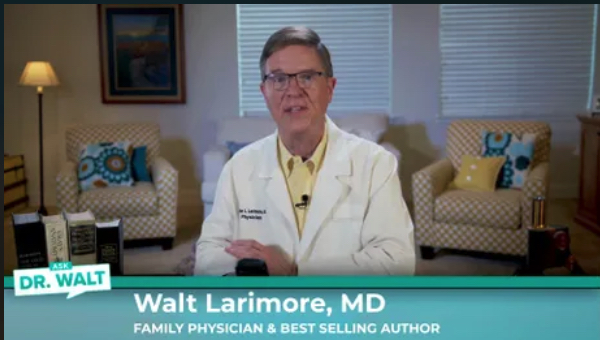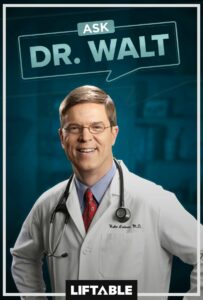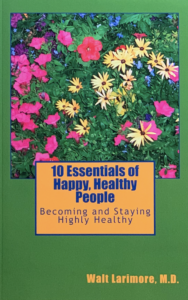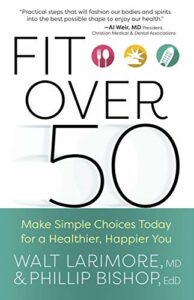
The Writer’s Studio 05 – My Interview with Journalist Patricia Raybon (Part 1)
May 12, 2023
I’ve been selected a a Featured Author for this Fall’s Louisiana Book Festival
May 17, 2023Do you want to know the secrets of how to make simple choices for a happier, healthier you — a you that will have more quality and quantity of life? In this episode, I’ll break down my “four health wheels” to help you and your family become more highly healthy while living a longer and better life. You can click below to watch a video of the show, or I’ve put the show transcript at the end of the blog if you’d prefer that.
From 2021-2022, I was honored to host a TV show on LiftableTV, “Ask Dr. Walt.” Today, I’m releasing Episode #4, FOUR KEYS TO BECOMING HIGHLY HEALTHY. I hope you’ll enjoy it.
Research shows that there are four factors that we must each consider if we wish to be as highly healthy as possible. What are they and how do I know if I’m healthy in each of these spheres? I’m going to show you today on this edition of Ask Dr. Walt.
You can learn more about this topic in my best-selling book, 10 Essentials of Happy, Healthy People: Becoming and staying highly healthy or Fit over 50: Make Simple Choices for a Healthier, Happier You.
CLICK HERE FOR 10 E’S CLICK HERE FOR Fo50
Disclaimer: The Ask Dr. Walt show is designed for entertainment purposes to give information on various medical conditions, treatments, and procedures for your personal knowledge and to help you be a more informed consumer of medical and health services.
SHOW TRANSCRIPT
Four Keys to Becoming Highly Healthy
TEASE:
Research shows that there are four factors that we must each consider if we wish to be as highly healthy as possible. What are they and how do I know if I’m healthy in each of these spheres? I’m going to show you today on this edition of Ask Dr. Walt.
OPEN:
Hi, everyone. I’m family physician Dr. Walt Larimore and I’m delighted you are taking the time today to join me in my office to chat about how to become or remain highly healthy.
During medical school and my family medicine residency at Duke, I was taught to recognize and treat diseases. I had little training in keeping people healthy and even less in motivating people to become fit and healthy. So, for most of my career, I have had to learn ways to promote health, not just treat sickness.
Four of my best-selling books are on this topic. Three contain the words “highly healthy” and the fourth is Fit over 50: Make Simple Choices for a Healthier, Happier You. But don’t let that title fool you. Fit over 50 has tips for every age and is particularly helpful for those under 50 who want to arrive at that age as healthful as possible.
| About ten years ago, I informally surveyed more than 200 physicians and health experts from many countries, asking them three questions: · What is health? · What are the essentials of health? · What tips would you give your patients, friends, and family on becoming healthier and living longer? |
After cataloging their responses, I searched the medical literature, scores of studies, and trustworthy medical recommendations, looking primarily at those focusing on wellness and longevity.
What surprised me was how much evidence there was suggesting that living long and well depended on the powerful connection between four facets of health:
| Dr. Walt’s “Four Health Wheels” · our physical health, · our emotional/mental health, · our relational/family health, and · our spiritual health. |
In 2003, I first called these “the four wheels of health.” I proposed that if these four “health” tires were not fully inflated and finely balanced, that one’s ride down the road of life would not be as smooth or as long as it could be. And breakdowns could be more frequent than desired.
I also proposed that of the four wheels of health, the spiritual wheel was the most important because it was connected to the “power steering” Himself.
Dr. John Fisher agrees, writing:
| At our core, or Coeur (the heart), we humans are spiritual beings. . . . Spiritual health is a, if not the, fundamental dimension of people’s overall health and well-being, permeating and integrating all the other dimensions of health.” |
Many people think physical health is the only aspect of health. But if you’re in great physical shape and yet suffering emotionally/mentally, relationally, or spiritually, are you highly healthy? You are not!
One doctor friend of mine told me about a patient of his who, in the prime of his adult life, became paralyzed from the neck down in an accident. Yet this man exuded hope and enthusiasm due to his deep relationship with God, supplemented by his rich family and social relationships. My friend wrote:
| “The essence of true health is physical, emotional, social, and spiritual well-being. When these four dimensions are singing in harmony, you’re healthy. That doesn’t mean there’s no room for a dissonant chord, but that the music of life is pleasant to the ear. My quadriplegic patient seems to me to be highly healthy, despite his sobering physical disability.” |
I have cared for many seriously disabled or diseased people in my forty years as a family physician who seem far healthier than most of my patients. What they all share is a conscious and continuous effort to seek the highest possible degree of health in four aspects of their lives: physical, emotional/mental, relational/social, and spiritual/religious.
Results of a 2018 Harris Poll survey of more than 2,000 American adults examined how people define being healthy. They reported:
| “Ninety-two percent of adults agreed with the statement, ‘Health is so much more than just not being sick.’” |
Interestingly, my four health wheels are similar to what is now described by many experts. For example, a group of university researchers in India wrote:
| “Spirituality has now been identified globally as an important aspect for providing answers to many questions related to health and happiness. The World Health Organization is also keen at looking beyond physical, mental and social dimensions of the health, and the member countries are actively exploring the 4th Dimension of the health, the spiritual health and its impact on the overall health and happiness of an individual.” |
Here’s how I define the four wheels of highly healthy people:
| Dr. Walt’s Definitions of The Four Wheels of Highly Healthy People: · Physical health is the well-being of one’s body. · Emotional and mental health is the well-being of one’s mental faculties and one’s connection with their emotions. · Relational and social health is the well-being of one’s associations with family, friends, and faith in the context of a healthy community. · Spiritual health is the well-being of one’s relationship with God. |
I think the spiritual aspect is a surprise for many of my patients. Harold Koenig, MD, a family physician and psychiatrist who is director of the Center for Spirituality, Theology and Health at Duke University, wrote,
| · “I have reviewed and summarized hundreds of quantitative original data-based research reports examining relationships between religion/spirituality and health. · “These reports have been published in peer-reviewed journals in medicine, nursing, social work, rehabilitation, social sciences, counseling, psychology, psychiatry, public health, demography, economics, and religion. · The majority of studies report significant relationships between religion/spirituality and better health.” |
Because of this I believe physicians shouldn’t just ask, “What’s the matter?” but, “What matters?”
English cleric and theologian John Wesley, a cofounder of Methodism, wanted his family, friends, and followers to enjoy healthy lives. In 1747 he wrote “Primitive Physick, or An Easy and Natural Method of Curing Most Diseases.” Wesley defines “physic” as “the art of healing.”
| “Physic is the art of healing.” |
In this treatise he suggested over three dozen rules for living a balanced life and preventing disease —r ules that involve all four wheels of health. These are my favorites:
| 1. People should have those who . . . are much about them (who are) sound, sweet, and healthy. 2. Water is the wholesomest of all drinks. 3. Persons should eat very light suppers and that two or three hours before going to bed. 4. Constantly go to bed about nine and rise at four or five. 5. A due degree of exercise is indispensably necessary to health and long life. Walking is the best exercise. . . . The open air, when the weather is fair, contributes much to the benefit of exercise. |
| 6. Those who read or write much, should learn to do it standing; otherwise, it will impair their health. 7. Exercise first, should be always on an empty stomach; secondly, should never be continued to weariness; thirdly, after it, we should take to cool by degrees. 8. The slow and lasting passions, such as grief and hopelessness, bring on chronical diseases. 9. Till the passion which caused the disease is calmed, medicine is applied in vain. 10. The love of God, as it is the sovereign remedy of all miseries . . . and by the unspeakable joy and perfect calm serenity and tranquility it gives the mind; it becomes the most powerful of all the means of health and long life. |
Could you hear the four wheels in these health tips? And, did you see that Wesley identified spiritual health, which he defined as “the love of God,” as “the sovereign remedy of all miseries.” Definitely the health wheel connected to power steering.
These four wheels are also outlined in the Bible, where Luke, the only physician who wrote books included in the Bible; the Gospel of Luke and Acts, which by the way contain more words than all of Paul’s writings; anyway Dr. Luke observed of the pre-teen Jesus:
| “And Jesus grew in wisdom and stature, and in favor with God and man.” |
Did you hear the four wheels?
| “And Jesus grew in wisdom and stature, and in favor with God and man.” 1. Jesus grew in wisdom – emotional and mental health 2. stature – physical health, 3. in favor with God – spiritual health, and 4. man – relational and social health. |
How many people have we met who have all four wheels perfectly balanced? None. Not a single person! The important thing to remember is that we all share a common need to constantly balance the different parts of our life. Maintaining a highly healthy balance is a lifelong and life-enhancing task.
Unfortunately, simply watching a health program, even a great one like this, won’t make you highly healthy.
In my book, Fit over 50, I wrote”
| · “To become a highly healthy person, you’ll need to understand the four wheels of health and then take personal responsibility for your health. · “The average person tends to neglect what is needed to become highly healthy. Why? Because it takes work, and it takes time. · “You may be enticed by some healthcare scammers who promise that their particular therapy, tonic, or tablet will simply, easily, and quickly cure all that ails you. It won’t.” |
So, where do you start? I’m glad you asked.
Along with the health professionals at Kaiser Health, I developed a tool to help you assess and measure the current status of each of your four health wheels.
Visit my website at DrWalt.com and scroll to the bottom of the page where you’ll see a link to “Assessment Tools and Websites.”
Click on and print off the “4 Wheel Diagram—Adult.”
Then, click on either:
- “Assess Your Health—Adult” or
- “Assess Your Health—Christian.”
The latter has a more robust spiritual history for Christians.
Now, it can take up to an hour to take and grade the assessments, but if you’re totally honest with your answers, when you’re finished, you’ll have an accurate picture of your four health wheels.
Are any flat? Out of balance? In need of a tune-up? If so, this show is going to be just for you.
Now, this is the part of the program where I normally take your questions and comments. But today, I want to show you an example or two of how these four-wheel diagrams work.
Let’s look at an example, a patient of mine:
| · 34-year-old, married, Caucasian female · Three children under 5 years old · A husband who frequently traveled and worked long days. · Regularly attends church. · Her medical problem list included very irregular and heavy menstrual cycles, chronic tension headaches, adult acne, insomnia, nightmares, fatigue, decreased sexual appetite, and mild depression. |
In short, she was miserable. She could have problems with all four wheels of her health. Where in the world would I start? Well, we did the four-wheel assessment.
I want to show you her four-wheel diagram and in mere seconds, you’ll be able to see which of her health wheels is most out of balance.
GRAPHIC
For this lady, we needed to start with her spiritual wheel as it was the “flattest.” The second “out of balance” wheel was her physical health wheel.
Here’s another case from my files.
| · A 14-year-old African American male · Brought to my office by his dad. ‘His family was active in church. · His complaints were obesity, fatigue, poor sleep and lots of “problems with other kids.” |
Unfortunately, this sounds like a lot of our teens these days, right? But within seconds of looking at his 4-wheel diagram, you’ll have a clue of where I needed to focus my attention.
GRAPHIC
His flattest spoke was the nutritional and substance abuse spoke. His second “flattest” spoke was in the area of overusing media. Spiritually and relationally, he was pretty balanced. But in very short order I was able to work with this young man and his family to better balance his spokes and I’m happy to say he’s grown into a very well-balanced man, husband, father, and pastor.
Here’s my challenge for you. Go to DrWalt.com. Download the 4-wheel diagram and the assessment tool. Honestly answer all the questions, used the self-grading tool, draw out your four wheels, and send them to me. I’d love to include some in future programs.
Until our next visit, “Dear friend, I pray that you may enjoy good health and that all may go well with you, even as your soul is getting along well.”
© Copyright WLL, INC. 2023. This blog provides healthcare tips and advice you can trust about a wide variety of general health information only and is not intended to substitute for professional medical advice, diagnosis, or treatment from your regular physician. If you are concerned about your health, take what you learn from this blog and meet with your personal doctor to discuss your concerns.








